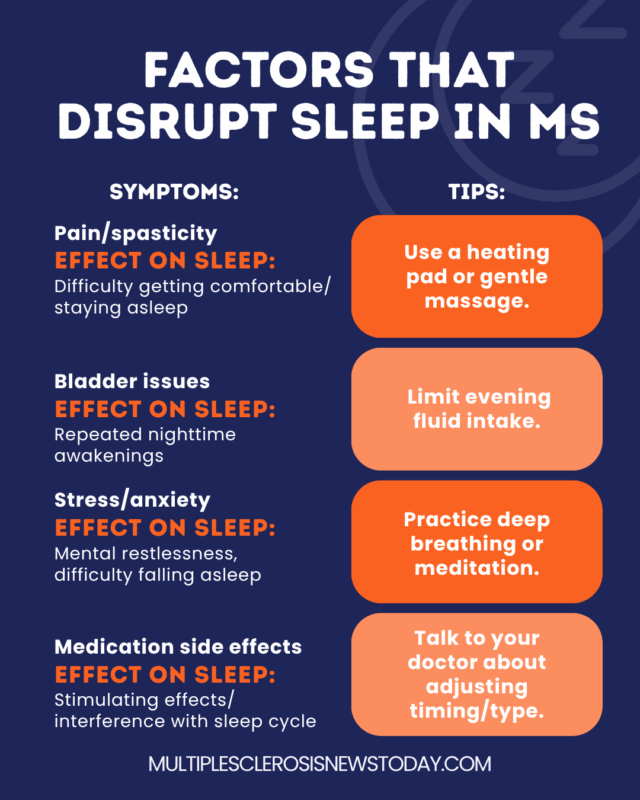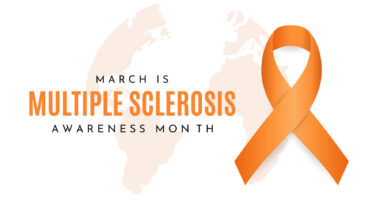 Discussion
Discussion
MS and sleep: Tips for getting better rest
Last updated April 30, 2025, by Roslyn Marano

Sleep is essential for overall health, but getting quality rest can be challenging for people with multiple sclerosis (MS). MS symptoms like pain, muscle spasms, and sensitivity to temperature changes can make falling or staying asleep difficult, leading to fatigue and a lower quality of life.
In some cases, sleep problems from MS may be directly linked to the disease, while in others, factors like stress, medication side effects, or environmental influences play a role.
For example, sensitivity to heat may make it harder to sleep in a warm room, while disruptions from noise or light, or even an uncomfortable mattress, can further interfere with rest.
The good news is that there are ways to improve your sleep, even with MS. By understanding how MS and sleep are connected, you can build an MS sleep routine that works for you.
Understanding sleep issues in MS
Sleep challenges can show up early in MS or develop over time. These issues may come and go with symptom flares, or relapses, or be caused by environmental or emotional changes.
They have been shown to worsen perceived fatigue, increase irritability, impair memory and concentration, and reduce motivation. Expert commentary emphasizes that these symptoms often overlap, creating a cycle of poor rest and worsening fatigue.
Common sleep problems
Some of the most common sleep problems for people with MS include insomnia, restless leg syndrome (RLS), sleep apnea, and nocturia.
- Insomnia involves difficulty falling asleep, staying asleep, or both, which can leave you feeling unrefreshed and fatigued during the day.
- RLS causes an intense urge to move your legs, especially at night.
- Sleep apnea is when your breathing repeatedly stops and starts during sleep, which may contribute to daytime exhaustion.
- Nocturia means waking up multiple times to urinate during the night, and it’s a frequent issue for people with MS.
Each of these can contribute to MS sleep issues and can seriously interfere with your body’s recovery time.
Causes and contributing factors
How MS affects sleep depends on various factors. For example, for some people, their pain keeps them awake.
Pain and sleep are often linked in MS, as pain or discomfort from spasticity (muscle stiffness or tightness) or nerve damage may worsen when lying down, making it difficult to get comfortable and stay asleep.
Other contributing factors may include:
- nerve-related changes, which can occur when MS lesions disrupt the areas of the brain that regulate sleep cycles
- medication side effects, which may contribute to sleep difficulties, especially when treatments for MS or fatigue are stimulating or taken too late in the day
- stress, anxiety, and depression related to the uncertainty of MS, which may increase mental restlessness, making it harder to fall or stay asleep
- cold or heat sensitivity, which can interfere with rest, as temperature dysregulation may lead to nighttime discomfort or repeated waking
- comorbid sleep disorders like sleep apnea, RLS, insomnia, and nocturia.
Tips to improve your sleep with MS
Managing sleep problems with MS may require a few lifestyle changes, but even small changes can make a big difference. Consider these tips to help improve your sleep quality.
Follow a consistent sleep routine
Creating a structured routine can support your body’s natural rhythms. Try going to bed and waking up at the same time every day, including weekends.
In the evening, unwind with a calming activity like reading or light stretching. Keeping naps short and taking them earlier in the day may also support better nighttime sleep.
Tackle MS symptoms that interfere with your sleep
MS symptoms can negatively affect sleep, but certain strategies may help.
- If pain or muscle spasms worsen at night, try a heating pad or a gentle massage, which may help relax your muscles.
- If your medications are interfering with sleep, talk to your doctor — sometimes adjusting the timing or type of treatment can make a difference.
- For bladder-related issues like nocturia, limit fluid intake in the evening to reduce nighttime awakenings.
- If insomnia is a concern, consider cognitive behavioral therapy, which targets thought and behavior patterns that interfere with sleep.
Practice relaxation techniques
Stress and anxiety are common contributors to MS and insomnia. Consider incorporating relaxation techniques and other stress-relieving strategies into your routine, such as:
- deep breathing
- meditation
- gentle exercise
- muscle relaxation.
Even a short wind-down period before bed can have a meaningful impact on your sleep quality.
In some cases, cannabis products may support relaxation and may aid sleep, though experts caution that more research is needed. Speak with your healthcare provider to explore this option safely.
Make your sleep space work for you
Your bedroom should be a restful place, not a source of stimulation. By making your room darker, quieter, and cooler, you can reduce tension and help your body stay asleep longer.
- Keep your room at a lower temperature if you struggle with heat sensitivity.
- Use blackout curtains, white noise machines, or cooling fans to create a restful space.
- Assess your mattress and pillows, as poor sleep positioning may contribute to sleep-disordered breathing or discomfort during the night.
- Avoid using your bed for activities like eating, watching TV, or scrolling on your phone to help your brain associate it with sleep.
Watch what you eat and drink
What you consume in the evening can influence how you sleep. Avoid caffeine, alcohol, and heavy meals close to bedtime, as they can interfere with your ability to fall and stay asleep.
Instead, try a small snack or a warm, non-caffeinated drink like herbal tea to help your body wind down.
These small nutrition choices can make a big difference when managing sleep and fatigue in MS.

Knowing when to seek help
Sleep issues are common with MS, but persistent or worsening problems may signal something more.
Poor sleep quality linked to MS symptoms like pain, bladder issues, or medication side effects can often be managed with routine adjustments. But if your sleep doesn’t improve, it may be time to involve your doctor.
Talk to your provider if you’re experiencing:
- trouble falling or staying asleep despite changes to your routine
- daytime fatigue that affects focus or daily tasks
- MS symptoms that worsen after poor or interrupted sleep.
If your provider suspects another cause, such as sleep apnea, they may recommend a sleep study.
Don’t ignore ongoing sleep problems — working with your care team can help you get the rest you need to feel better and improve your quality of life.
Multiple Sclerosis News Today is strictly a news and information website about the disease. It does not provide medical advice, diagnosis, or treatment. This content is not intended to be a substitute for professional medical advice, diagnosis, or treatment. Always seek the advice of your physician or other qualified health provider with any questions you may have regarding a medical condition. Never disregard professional medical advice or delay in seeking it because of something you have read on this website.
Recommended Posts
- Ironically, cutting out coffee gave me a boost of energy
- MS Awareness Month events highlight advocacy, education, fundraising
- I’m going to be more open about my invisible scars from MS
- Having parents who smoked increases risk of pediatric MS: Study
- Ocrevus and Tysabri appear to work equally well to control relapsing MS
Related content
-
 Discussion
Discussion
-
-




